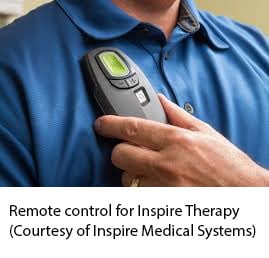Sleep Apnea
Schedule an Appointment
Our Sleep Medicine team uses advanced technology to diagnose and treat sleep disorders at a variety of locations throughout the community. To schedule an appointment, call 216-778-5864.
What is Sleep Apnea?
The Greek word “apnea” means “without breath.” But, if you or a loved one have experienced sleep apnea, you know that apnea comes with many loud symptoms: snoring, choking and gasping noises.
If you are seeking treatment to stop snoring, what you may need is treatment from a sleep apnea specialist.
Sleep apnea is very common, almost as common as diabetes or asthma in adults, and can be very serious. In sleep apnea, breathing stops or gets very shallow during sleep. Each pause in breathing typically lasts 10-20 seconds or more, and can occur 20-30 times or more an hour.
There are two main types of apnea:
- Obstructive sleep apnea (OSA), the most common, is caused by a narrowing of the airway, usually when the soft tissue in the back of the throat collapses during sleep. This may lead to a low oxygen level in your blood dropping. Normal breathing often starts again with a loud snort or choking sound.
- In central sleep apnea, the airway is not restricted but the brain fails to signal the muscles to breathe.
With each disturbed breathing event, the brain briefly arouses in order to resume breathing. Consequently, sleep becomes fragmented leading to poor quality sleep and sleepiness during the day.
Sleep apnea happens more often in people who are overweight, but even thin people can have it.
Most people don’t know they have sleep apnea. A family member and/or bed partner may notice the signs of sleep apnea first.
Untreated sleep apnea can increase the chance of having high blood pressure and even a heart attack or stroke. Untreated sleep apnea can also increase the risk for work-related accidents and driving accidents resulting from sleepiness and decreased vigilance.
- Being male (though women, especially post-menopause, may also have it)
- Being overweight
- Older than forty years old
- Having a family history of sleep apnea
Sleep apnea can occur in anyone at any age, even children. Yet, most cases remain undiagnosed and therefore untreated. Less than 20% of all OSA patients are receiving treatment at the present time.
The most common signs of sleep apnea are:
- Loud snoring
- Choking or gasping during sleep
- Sleepiness during the day (even at work or while driving)
- Morning headaches
- Memory or learning problems, such as not being able to concentrate on your work
- Feeling irritable, mood swings or personality changes; perhaps feeling depressed
- Dry throat when you wake up
- Frequent urination at night
Your doctor will take a medical history that includes asking you and your family questions about your sleep and how you function during the day, and then perform a physical exam.
Your doctor may order one of two types of sleep studies to determine what happens with your breathing while you sleep. You may stay overnight in the sleep center for an in-lab sleep study, although some sleep studies can be done at home.
Polysomnogram (Sleep Lab Study)
The most common sleep recording is called a polysomnogram (poly-SOM-no-gram), or PSG.
This test occurs in a sleep facility and records:
- Brain activity
- Eye movement
- Muscle activity
- Breathing and heart rate
- How much air moves in and out of your lungs while you are sleeping
- The percentage of oxygen in your blood
The results of your PSG will be analyzed by a sleep medicine specialist to see if you have sleep apnea, how severe it is, and what treatment may be recommended.
Learn more about the polysomnogram (poly-SOM-no-gram), or PSG, sleep test.
Home Sleep Apnea Test, or HSAT
In certain circumstances, the sleep study can be done at home (also called a Home Sleep Apnea Test, or HSAT).
A home monitor can be used to record your heart rate, how air moves in and out of your lungs, the amount of oxygen in your blood, and your breathing effort. For this test, you will pick up the device and a technician will show you how to apply the monitor that you will wear overnight at home. You return the device the next day.
Once all your tests are completed, the sleep medicine specialist will review the results and work with you to develop a treatment plan.

Treatment is aimed at restoring regular nighttime breathing and relieving symptoms such as very loud snoring and daytime sleepiness. Treatment will also help associated medical problems, such as high blood pressure, and may reduce the risk for heart attack and stroke.
If you have mild sleep apnea, some changes in daily activities or habits may be all that are needed:
- Avoid alcohol, smoking, and medicines that make you sleepy.
- Lose weight if you are overweight. Even a little weight loss can improve your symptoms.
- Sleep on your side instead of your back. Sleeping on your side may help keep your throat open.
People with moderate or severe sleep apnea will need to make these changes as well. They also will need other treatments. They may range from a positive airway pressure device (such as CPAP), a variety of surgeries (including the Inspire device) or use of an oral appliance. Your sleep medicine specialist will help determine what therapy may be most appropriate for you.